International Marketing Management Report: Argentina Expansion
VerifiedAdded on 2021/06/17
|10
|2437
|37
Report
AI Summary
This report delves into the international marketing management strategies for Smithfield Cattle Company, an Australian beef supplier, as it explores expansion into Argentina. The report begins with an overview of international business and the challenges faced by companies venturing into foreign markets. It then provides background on Smithfield Cattle Company and the Argentinian beef market, analyzing factors favoring foreign investment in Argentina, including social, cultural, political, economic, and technological aspects. Strategic reasons for expansion, such as increased sales and market share, are discussed, alongside potential market entry strategies like direct export and joint ventures. The report also highlights probable challenges such as climate conditions, disease, and economic instability. The conclusion emphasizes the importance of thorough market research and the potential for success in Argentina, suggesting strategies like direct exportation and joint ventures for Smithfield Cattle Company's expansion. The report includes a comprehensive list of references to support its findings.

INTERNATIONAL MARKETING MANAGEMENT 1
International Marketing Management
Name:
Institution:
Course:
Tutor:
Date:
International Marketing Management
Name:
Institution:
Course:
Tutor:
Date:
Paraphrase This Document
Need a fresh take? Get an instant paraphrase of this document with our AI Paraphraser
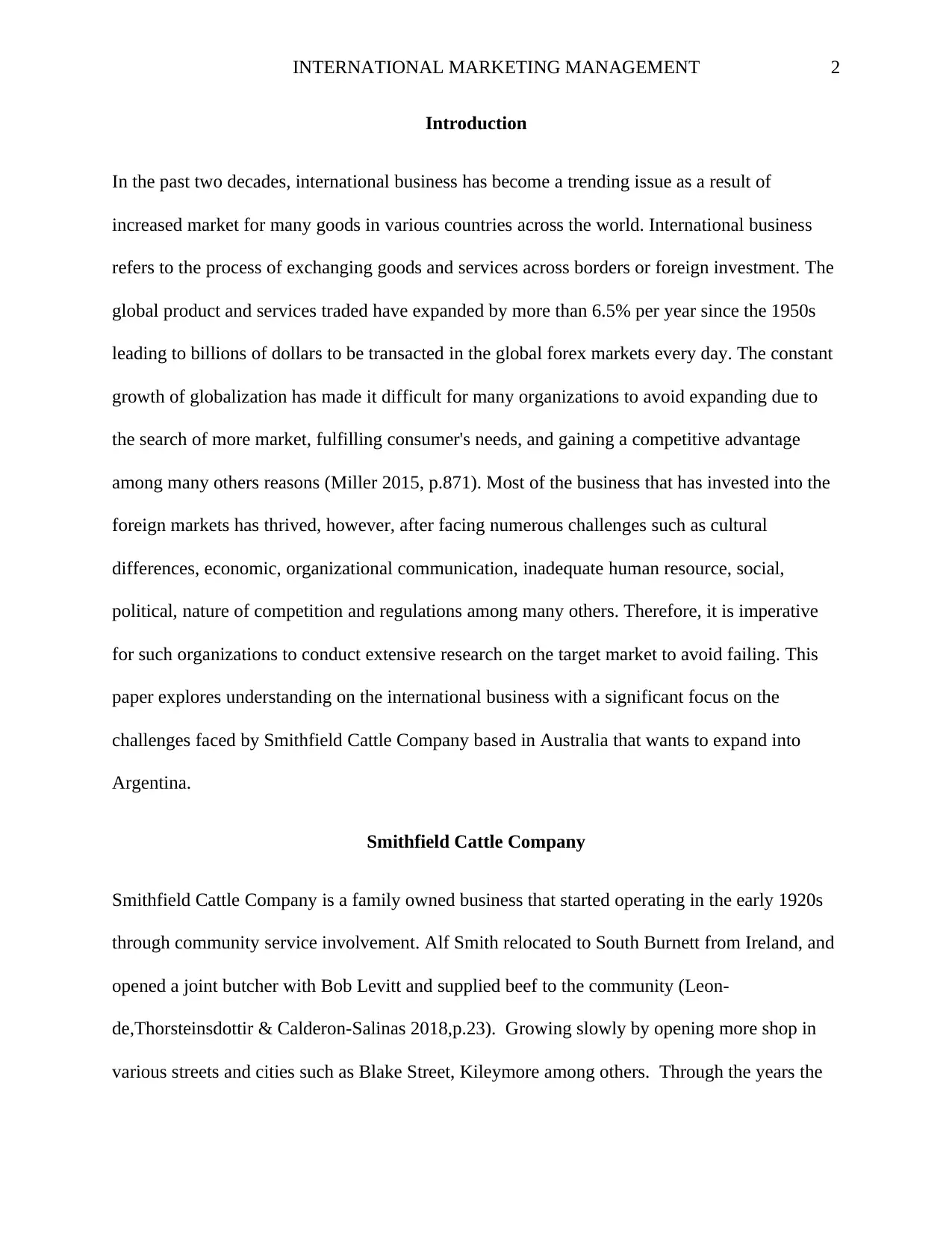
INTERNATIONAL MARKETING MANAGEMENT 2
Introduction
In the past two decades, international business has become a trending issue as a result of
increased market for many goods in various countries across the world. International business
refers to the process of exchanging goods and services across borders or foreign investment. The
global product and services traded have expanded by more than 6.5% per year since the 1950s
leading to billions of dollars to be transacted in the global forex markets every day. The constant
growth of globalization has made it difficult for many organizations to avoid expanding due to
the search of more market, fulfilling consumer's needs, and gaining a competitive advantage
among many others reasons (Miller 2015, p.871). Most of the business that has invested into the
foreign markets has thrived, however, after facing numerous challenges such as cultural
differences, economic, organizational communication, inadequate human resource, social,
political, nature of competition and regulations among many others. Therefore, it is imperative
for such organizations to conduct extensive research on the target market to avoid failing. This
paper explores understanding on the international business with a significant focus on the
challenges faced by Smithfield Cattle Company based in Australia that wants to expand into
Argentina.
Smithfield Cattle Company
Smithfield Cattle Company is a family owned business that started operating in the early 1920s
through community service involvement. Alf Smith relocated to South Burnett from Ireland, and
opened a joint butcher with Bob Levitt and supplied beef to the community (Leon-
de,Thorsteinsdottir & Calderon-Salinas 2018,p.23). Growing slowly by opening more shop in
various streets and cities such as Blake Street, Kileymore among others. Through the years the
Introduction
In the past two decades, international business has become a trending issue as a result of
increased market for many goods in various countries across the world. International business
refers to the process of exchanging goods and services across borders or foreign investment. The
global product and services traded have expanded by more than 6.5% per year since the 1950s
leading to billions of dollars to be transacted in the global forex markets every day. The constant
growth of globalization has made it difficult for many organizations to avoid expanding due to
the search of more market, fulfilling consumer's needs, and gaining a competitive advantage
among many others reasons (Miller 2015, p.871). Most of the business that has invested into the
foreign markets has thrived, however, after facing numerous challenges such as cultural
differences, economic, organizational communication, inadequate human resource, social,
political, nature of competition and regulations among many others. Therefore, it is imperative
for such organizations to conduct extensive research on the target market to avoid failing. This
paper explores understanding on the international business with a significant focus on the
challenges faced by Smithfield Cattle Company based in Australia that wants to expand into
Argentina.
Smithfield Cattle Company
Smithfield Cattle Company is a family owned business that started operating in the early 1920s
through community service involvement. Alf Smith relocated to South Burnett from Ireland, and
opened a joint butcher with Bob Levitt and supplied beef to the community (Leon-
de,Thorsteinsdottir & Calderon-Salinas 2018,p.23). Growing slowly by opening more shop in
various streets and cities such as Blake Street, Kileymore among others. Through the years the
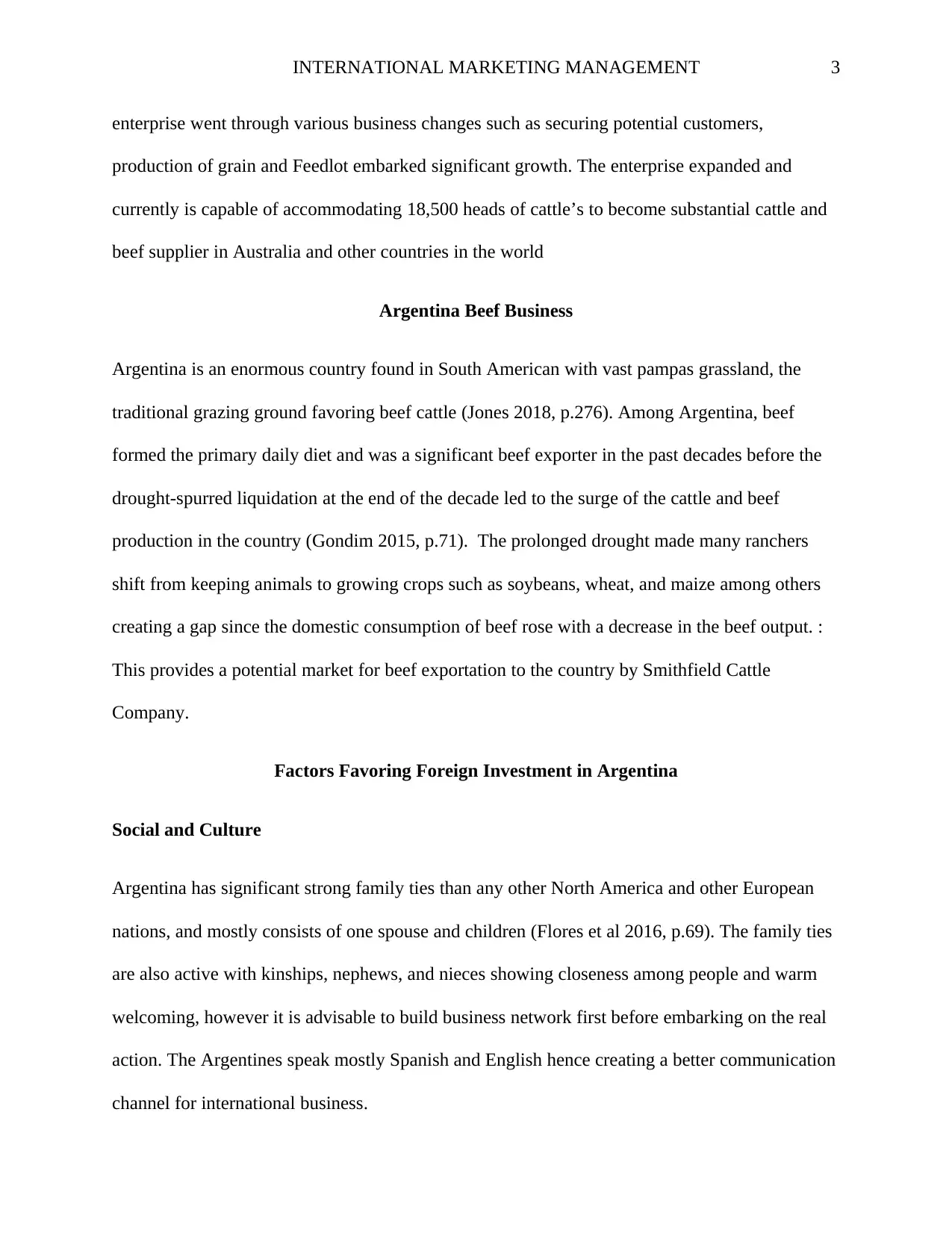
INTERNATIONAL MARKETING MANAGEMENT 3
enterprise went through various business changes such as securing potential customers,
production of grain and Feedlot embarked significant growth. The enterprise expanded and
currently is capable of accommodating 18,500 heads of cattle’s to become substantial cattle and
beef supplier in Australia and other countries in the world
Argentina Beef Business
Argentina is an enormous country found in South American with vast pampas grassland, the
traditional grazing ground favoring beef cattle (Jones 2018, p.276). Among Argentina, beef
formed the primary daily diet and was a significant beef exporter in the past decades before the
drought-spurred liquidation at the end of the decade led to the surge of the cattle and beef
production in the country (Gondim 2015, p.71). The prolonged drought made many ranchers
shift from keeping animals to growing crops such as soybeans, wheat, and maize among others
creating a gap since the domestic consumption of beef rose with a decrease in the beef output. :
This provides a potential market for beef exportation to the country by Smithfield Cattle
Company.
Factors Favoring Foreign Investment in Argentina
Social and Culture
Argentina has significant strong family ties than any other North America and other European
nations, and mostly consists of one spouse and children (Flores et al 2016, p.69). The family ties
are also active with kinships, nephews, and nieces showing closeness among people and warm
welcoming, however it is advisable to build business network first before embarking on the real
action. The Argentines speak mostly Spanish and English hence creating a better communication
channel for international business.
enterprise went through various business changes such as securing potential customers,
production of grain and Feedlot embarked significant growth. The enterprise expanded and
currently is capable of accommodating 18,500 heads of cattle’s to become substantial cattle and
beef supplier in Australia and other countries in the world
Argentina Beef Business
Argentina is an enormous country found in South American with vast pampas grassland, the
traditional grazing ground favoring beef cattle (Jones 2018, p.276). Among Argentina, beef
formed the primary daily diet and was a significant beef exporter in the past decades before the
drought-spurred liquidation at the end of the decade led to the surge of the cattle and beef
production in the country (Gondim 2015, p.71). The prolonged drought made many ranchers
shift from keeping animals to growing crops such as soybeans, wheat, and maize among others
creating a gap since the domestic consumption of beef rose with a decrease in the beef output. :
This provides a potential market for beef exportation to the country by Smithfield Cattle
Company.
Factors Favoring Foreign Investment in Argentina
Social and Culture
Argentina has significant strong family ties than any other North America and other European
nations, and mostly consists of one spouse and children (Flores et al 2016, p.69). The family ties
are also active with kinships, nephews, and nieces showing closeness among people and warm
welcoming, however it is advisable to build business network first before embarking on the real
action. The Argentines speak mostly Spanish and English hence creating a better communication
channel for international business.
⊘ This is a preview!⊘
Do you want full access?
Subscribe today to unlock all pages.

Trusted by 1+ million students worldwide
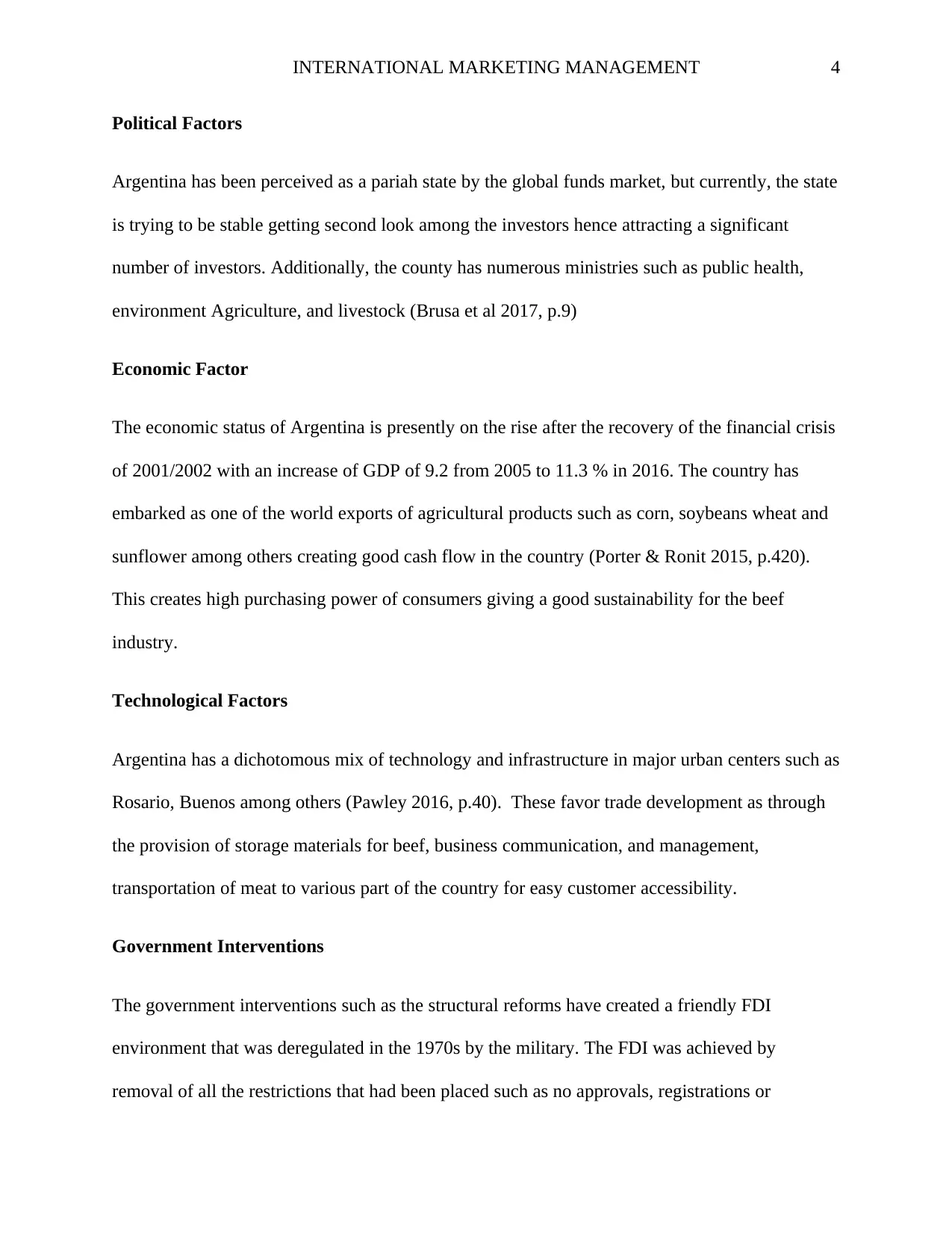
INTERNATIONAL MARKETING MANAGEMENT 4
Political Factors
Argentina has been perceived as a pariah state by the global funds market, but currently, the state
is trying to be stable getting second look among the investors hence attracting a significant
number of investors. Additionally, the county has numerous ministries such as public health,
environment Agriculture, and livestock (Brusa et al 2017, p.9)
Economic Factor
The economic status of Argentina is presently on the rise after the recovery of the financial crisis
of 2001/2002 with an increase of GDP of 9.2 from 2005 to 11.3 % in 2016. The country has
embarked as one of the world exports of agricultural products such as corn, soybeans wheat and
sunflower among others creating good cash flow in the country (Porter & Ronit 2015, p.420).
This creates high purchasing power of consumers giving a good sustainability for the beef
industry.
Technological Factors
Argentina has a dichotomous mix of technology and infrastructure in major urban centers such as
Rosario, Buenos among others (Pawley 2016, p.40). These favor trade development as through
the provision of storage materials for beef, business communication, and management,
transportation of meat to various part of the country for easy customer accessibility.
Government Interventions
The government interventions such as the structural reforms have created a friendly FDI
environment that was deregulated in the 1970s by the military. The FDI was achieved by
removal of all the restrictions that had been placed such as no approvals, registrations or
Political Factors
Argentina has been perceived as a pariah state by the global funds market, but currently, the state
is trying to be stable getting second look among the investors hence attracting a significant
number of investors. Additionally, the county has numerous ministries such as public health,
environment Agriculture, and livestock (Brusa et al 2017, p.9)
Economic Factor
The economic status of Argentina is presently on the rise after the recovery of the financial crisis
of 2001/2002 with an increase of GDP of 9.2 from 2005 to 11.3 % in 2016. The country has
embarked as one of the world exports of agricultural products such as corn, soybeans wheat and
sunflower among others creating good cash flow in the country (Porter & Ronit 2015, p.420).
This creates high purchasing power of consumers giving a good sustainability for the beef
industry.
Technological Factors
Argentina has a dichotomous mix of technology and infrastructure in major urban centers such as
Rosario, Buenos among others (Pawley 2016, p.40). These favor trade development as through
the provision of storage materials for beef, business communication, and management,
transportation of meat to various part of the country for easy customer accessibility.
Government Interventions
The government interventions such as the structural reforms have created a friendly FDI
environment that was deregulated in the 1970s by the military. The FDI was achieved by
removal of all the restrictions that had been placed such as no approvals, registrations or
Paraphrase This Document
Need a fresh take? Get an instant paraphrase of this document with our AI Paraphraser

INTERNATIONAL MARKETING MANAGEMENT 5
formalities that are required from the foreign direct investors (de Oliveira et al 2017, p.31).
Additionally, there was no discriminatory withholding of taxes on profit remittance from the
FDI.
The removal of these restrictions has led the Argentina government to sign several trade treaties
such as Multinational Agreement on Investment hence providing a better ground for the
Smithfield Beef Company to invest in the country. Other policies that positively impacted
international trade in Argentina include privatization, trade liberation and provision of specific
incentives that attract investors (Backer 2015,p.156). The increase of FDI has positive on the
country’s economy, as more people felt employed, increased cash flow leading to increased
purchasing power.
Economic Integration
Argentina has been involved in several economic integrations that have considerably impacted
trade. Establishments of interactions such as Mercosur (Southern Common Market) in 1991
between Brazil, Paraguay, and Argentina eliminated trade barriers hence facilitating free
movement of products among the member's countries. The integration of Argentina into the
world market has positively impacted the economic growth of Argentina such as specialization
in comparative –advantage sectors (Wei 2017, p.332). More importantly, the interaction has
allowed passage of goods and service into the country, hence favoring the exportation of beef by
Smithfield Cattle Company.
Strategic Reasons for Expansions
Every business expands into the broader market for some ideas. For the Smithfield Cattle
Company, the associated strategic goals are: Increase the sales of cattle and beef through the
formalities that are required from the foreign direct investors (de Oliveira et al 2017, p.31).
Additionally, there was no discriminatory withholding of taxes on profit remittance from the
FDI.
The removal of these restrictions has led the Argentina government to sign several trade treaties
such as Multinational Agreement on Investment hence providing a better ground for the
Smithfield Beef Company to invest in the country. Other policies that positively impacted
international trade in Argentina include privatization, trade liberation and provision of specific
incentives that attract investors (Backer 2015,p.156). The increase of FDI has positive on the
country’s economy, as more people felt employed, increased cash flow leading to increased
purchasing power.
Economic Integration
Argentina has been involved in several economic integrations that have considerably impacted
trade. Establishments of interactions such as Mercosur (Southern Common Market) in 1991
between Brazil, Paraguay, and Argentina eliminated trade barriers hence facilitating free
movement of products among the member's countries. The integration of Argentina into the
world market has positively impacted the economic growth of Argentina such as specialization
in comparative –advantage sectors (Wei 2017, p.332). More importantly, the interaction has
allowed passage of goods and service into the country, hence favoring the exportation of beef by
Smithfield Cattle Company.
Strategic Reasons for Expansions
Every business expands into the broader market for some ideas. For the Smithfield Cattle
Company, the associated strategic goals are: Increase the sales of cattle and beef through the
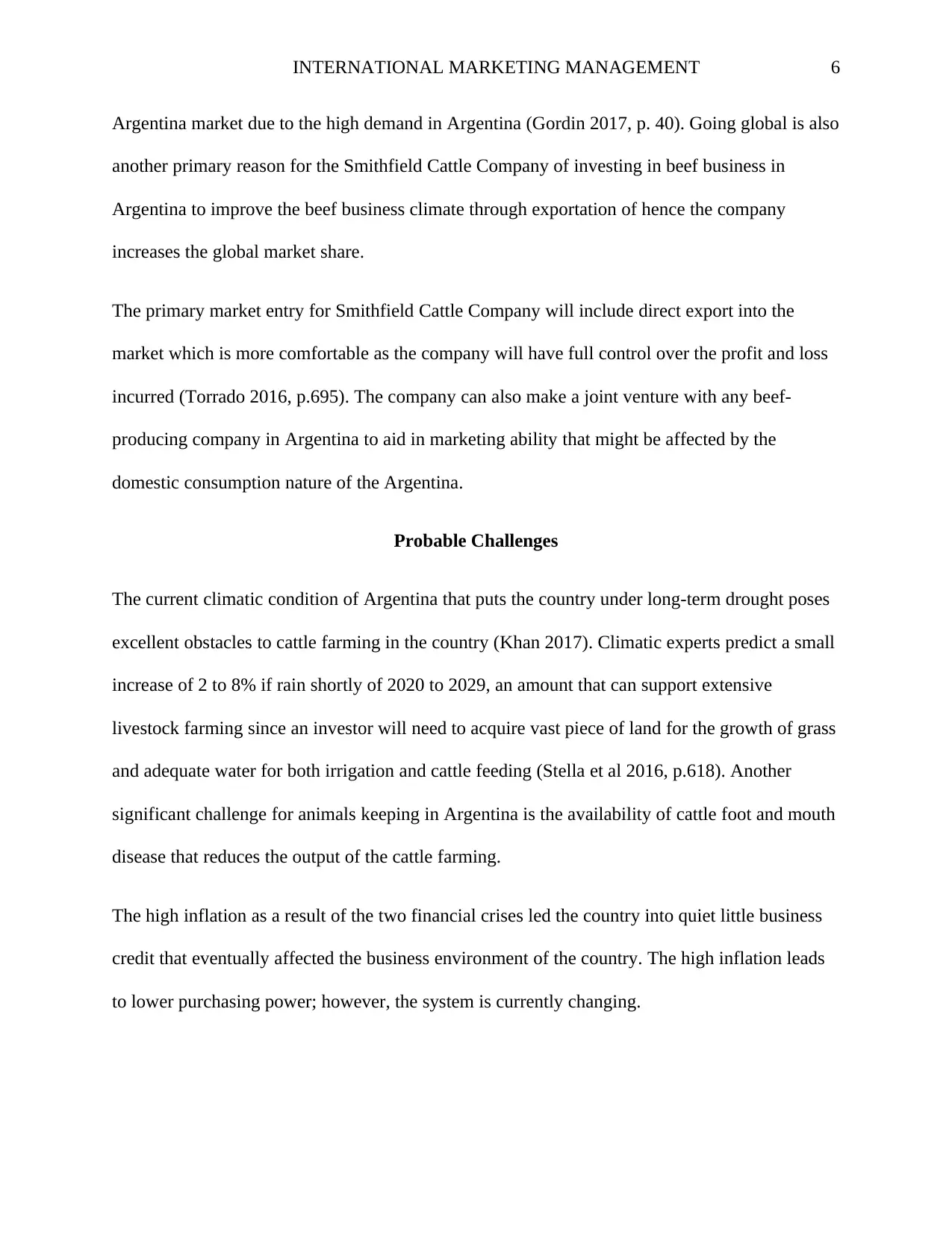
INTERNATIONAL MARKETING MANAGEMENT 6
Argentina market due to the high demand in Argentina (Gordin 2017, p. 40). Going global is also
another primary reason for the Smithfield Cattle Company of investing in beef business in
Argentina to improve the beef business climate through exportation of hence the company
increases the global market share.
The primary market entry for Smithfield Cattle Company will include direct export into the
market which is more comfortable as the company will have full control over the profit and loss
incurred (Torrado 2016, p.695). The company can also make a joint venture with any beef-
producing company in Argentina to aid in marketing ability that might be affected by the
domestic consumption nature of the Argentina.
Probable Challenges
The current climatic condition of Argentina that puts the country under long-term drought poses
excellent obstacles to cattle farming in the country (Khan 2017). Climatic experts predict a small
increase of 2 to 8% if rain shortly of 2020 to 2029, an amount that can support extensive
livestock farming since an investor will need to acquire vast piece of land for the growth of grass
and adequate water for both irrigation and cattle feeding (Stella et al 2016, p.618). Another
significant challenge for animals keeping in Argentina is the availability of cattle foot and mouth
disease that reduces the output of the cattle farming.
The high inflation as a result of the two financial crises led the country into quiet little business
credit that eventually affected the business environment of the country. The high inflation leads
to lower purchasing power; however, the system is currently changing.
Argentina market due to the high demand in Argentina (Gordin 2017, p. 40). Going global is also
another primary reason for the Smithfield Cattle Company of investing in beef business in
Argentina to improve the beef business climate through exportation of hence the company
increases the global market share.
The primary market entry for Smithfield Cattle Company will include direct export into the
market which is more comfortable as the company will have full control over the profit and loss
incurred (Torrado 2016, p.695). The company can also make a joint venture with any beef-
producing company in Argentina to aid in marketing ability that might be affected by the
domestic consumption nature of the Argentina.
Probable Challenges
The current climatic condition of Argentina that puts the country under long-term drought poses
excellent obstacles to cattle farming in the country (Khan 2017). Climatic experts predict a small
increase of 2 to 8% if rain shortly of 2020 to 2029, an amount that can support extensive
livestock farming since an investor will need to acquire vast piece of land for the growth of grass
and adequate water for both irrigation and cattle feeding (Stella et al 2016, p.618). Another
significant challenge for animals keeping in Argentina is the availability of cattle foot and mouth
disease that reduces the output of the cattle farming.
The high inflation as a result of the two financial crises led the country into quiet little business
credit that eventually affected the business environment of the country. The high inflation leads
to lower purchasing power; however, the system is currently changing.
⊘ This is a preview!⊘
Do you want full access?
Subscribe today to unlock all pages.

Trusted by 1+ million students worldwide

INTERNATIONAL MARKETING MANAGEMENT 7
Conclusion
International business boosts most of the business capability leading to high-profit making an
increase of market share. Many international businesses face different challenges such as
political instability, economic status among others. Therefore, it is upon the organization to do
extensive research regarding the market and the country to determine the viability of the
investment. Argentina has more significant advantages of foreign investment over challenges
hence favoring the move by Smithfield Cattle Company into the market through different
strategies such as direct exportation and joint venture.
Conclusion
International business boosts most of the business capability leading to high-profit making an
increase of market share. Many international businesses face different challenges such as
political instability, economic status among others. Therefore, it is upon the organization to do
extensive research regarding the market and the country to determine the viability of the
investment. Argentina has more significant advantages of foreign investment over challenges
hence favoring the move by Smithfield Cattle Company into the market through different
strategies such as direct exportation and joint venture.
Paraphrase This Document
Need a fresh take? Get an instant paraphrase of this document with our AI Paraphraser

INTERNATIONAL MARKETING MANAGEMENT 8
List of References
BACKER, LC 2015, 'Regulating Multinational Corporations: Trends, Challenges, and
Opportunities', Brown Journal Of World Affairs, 22, 1, pp. 153-173, Academic Search Premier,
EBSCOhost, viewed 17 May 2018.
Brusa, V, Restovich, V, Galli, L, Teitelbaum, D, Signorini, M, Brasesco, H, Londero, A, García,
D, Padola, N, Superno, V, Sanz, M, Petroli, S, Costa, M, Bruzzone, M, Sucari, A, Ferreghini, M,
Linares, L, Suberbie, G, Rodríguez, R, & Leotta, G 2017, 'Isolation and characterization of non-
O157 Shiga toxin-producing Escherichia coli from beef carcasses, cuts and trimmings of
abattoirs in Argentina', Plos ONE, 12, 8, pp. 1-16, Academic Search Premier, EBSCOhost,
viewed 17 May 2018.
de Oliveira, M, Schneider Hahn, I, dos Santos, M, de Souza, G, Cardozo Campos, D, & Pavanelo
Pivetta, N 2017, 'orientação Para O Mercado E Habilidades De Marketing Internacional: Um
Estudo Acerca Da Influência Sobre O Desempenho Internacional', Brazilian Journal Of
Management / Revista De Administração Da UFSM, 10, pp. 26-40, Academic Search Premier,
EBSCOhost, viewed 17 May 2018
Flores Falcão, R, Masiero, G, & Campomar, M 2016, 'Marketing performance of subsidiaries
operating abroad: An integrative model', Internext: Revista Electrônica De Negócios
Internacionais Da ESPM, 11, 3, pp. 64-77, Academic Search Premier, EBSCOhost, viewed 17
May 2018
List of References
BACKER, LC 2015, 'Regulating Multinational Corporations: Trends, Challenges, and
Opportunities', Brown Journal Of World Affairs, 22, 1, pp. 153-173, Academic Search Premier,
EBSCOhost, viewed 17 May 2018.
Brusa, V, Restovich, V, Galli, L, Teitelbaum, D, Signorini, M, Brasesco, H, Londero, A, García,
D, Padola, N, Superno, V, Sanz, M, Petroli, S, Costa, M, Bruzzone, M, Sucari, A, Ferreghini, M,
Linares, L, Suberbie, G, Rodríguez, R, & Leotta, G 2017, 'Isolation and characterization of non-
O157 Shiga toxin-producing Escherichia coli from beef carcasses, cuts and trimmings of
abattoirs in Argentina', Plos ONE, 12, 8, pp. 1-16, Academic Search Premier, EBSCOhost,
viewed 17 May 2018.
de Oliveira, M, Schneider Hahn, I, dos Santos, M, de Souza, G, Cardozo Campos, D, & Pavanelo
Pivetta, N 2017, 'orientação Para O Mercado E Habilidades De Marketing Internacional: Um
Estudo Acerca Da Influência Sobre O Desempenho Internacional', Brazilian Journal Of
Management / Revista De Administração Da UFSM, 10, pp. 26-40, Academic Search Premier,
EBSCOhost, viewed 17 May 2018
Flores Falcão, R, Masiero, G, & Campomar, M 2016, 'Marketing performance of subsidiaries
operating abroad: An integrative model', Internext: Revista Electrônica De Negócios
Internacionais Da ESPM, 11, 3, pp. 64-77, Academic Search Premier, EBSCOhost, viewed 17
May 2018

INTERNATIONAL MARKETING MANAGEMENT 9
Gondim Mariutti, F 2015, 'Reflections on the challenging mission of the country brand construct
in the international business setting', Internext: Revista Electrônica De Negócios Internacionais
Da ESPM, 10, 3, pp. 58-70, Academic Search Premier, EBSCOhost, viewed 17 May 2018.
Gordin, JP 2017, 'The Price of Institutional Design: Biased Territorial Representation and
Argentina’s Great Depression, 1998–2002', Journal Of Policy History, 29, 1, pp. 34-57,
Academic Search Premier, EBSCOhost, viewed 17 May 2018.
Jones, A 2018, 'Geographies of production III', Progress In Human Geography, 42, 2, pp. 275-
285, Academic Search Premier, EBSCOhost, viewed 17 May 2018.
Khan, MJ 2017, 'An Exploratory Evidence of the Types of Challenges and Opportunities
Perceived by the Small and Medium Enterprises (SMEs) in the Apparel Export Sector of
Pakistan', Abasyn University Journal Of Social Sciences, 10, 2, pp. 373-395, Academic Search
Premier, EBSCOhost, viewed 17 May 2018.
León-de la O, D, Thorsteinsdóttir, H, & Calderón-Salinas, J 2018, 'The rise of health
biotechnology research in Latin America: A scientometric analysis of health biotechnology
production and impact in Argentina, Brazil, Chile, Colombia, Cuba and Mexico', Plos ONE, 13,
2, pp. 1-28, Academic Search Premier, EBSCOhost, viewed 17 May 2018.
Miller, JC 2015, 'The critical intimacies of walking in the Abasto Shopping mall, Buenos Aires,
Argentina', Social & Cultural Geography, 16, 8, pp. 869-887, Academic Search Premier,
EBSCOhost, viewed 17 May 2018.
PAWLEY, E 2016, 'The Point of Perfection', Journal Of The Early Republic, 36, 1, pp. 37-72,
Academic Search Premier, EBSCOhost, viewed 17 May 2018.
Gondim Mariutti, F 2015, 'Reflections on the challenging mission of the country brand construct
in the international business setting', Internext: Revista Electrônica De Negócios Internacionais
Da ESPM, 10, 3, pp. 58-70, Academic Search Premier, EBSCOhost, viewed 17 May 2018.
Gordin, JP 2017, 'The Price of Institutional Design: Biased Territorial Representation and
Argentina’s Great Depression, 1998–2002', Journal Of Policy History, 29, 1, pp. 34-57,
Academic Search Premier, EBSCOhost, viewed 17 May 2018.
Jones, A 2018, 'Geographies of production III', Progress In Human Geography, 42, 2, pp. 275-
285, Academic Search Premier, EBSCOhost, viewed 17 May 2018.
Khan, MJ 2017, 'An Exploratory Evidence of the Types of Challenges and Opportunities
Perceived by the Small and Medium Enterprises (SMEs) in the Apparel Export Sector of
Pakistan', Abasyn University Journal Of Social Sciences, 10, 2, pp. 373-395, Academic Search
Premier, EBSCOhost, viewed 17 May 2018.
León-de la O, D, Thorsteinsdóttir, H, & Calderón-Salinas, J 2018, 'The rise of health
biotechnology research in Latin America: A scientometric analysis of health biotechnology
production and impact in Argentina, Brazil, Chile, Colombia, Cuba and Mexico', Plos ONE, 13,
2, pp. 1-28, Academic Search Premier, EBSCOhost, viewed 17 May 2018.
Miller, JC 2015, 'The critical intimacies of walking in the Abasto Shopping mall, Buenos Aires,
Argentina', Social & Cultural Geography, 16, 8, pp. 869-887, Academic Search Premier,
EBSCOhost, viewed 17 May 2018.
PAWLEY, E 2016, 'The Point of Perfection', Journal Of The Early Republic, 36, 1, pp. 37-72,
Academic Search Premier, EBSCOhost, viewed 17 May 2018.
⊘ This is a preview!⊘
Do you want full access?
Subscribe today to unlock all pages.

Trusted by 1+ million students worldwide
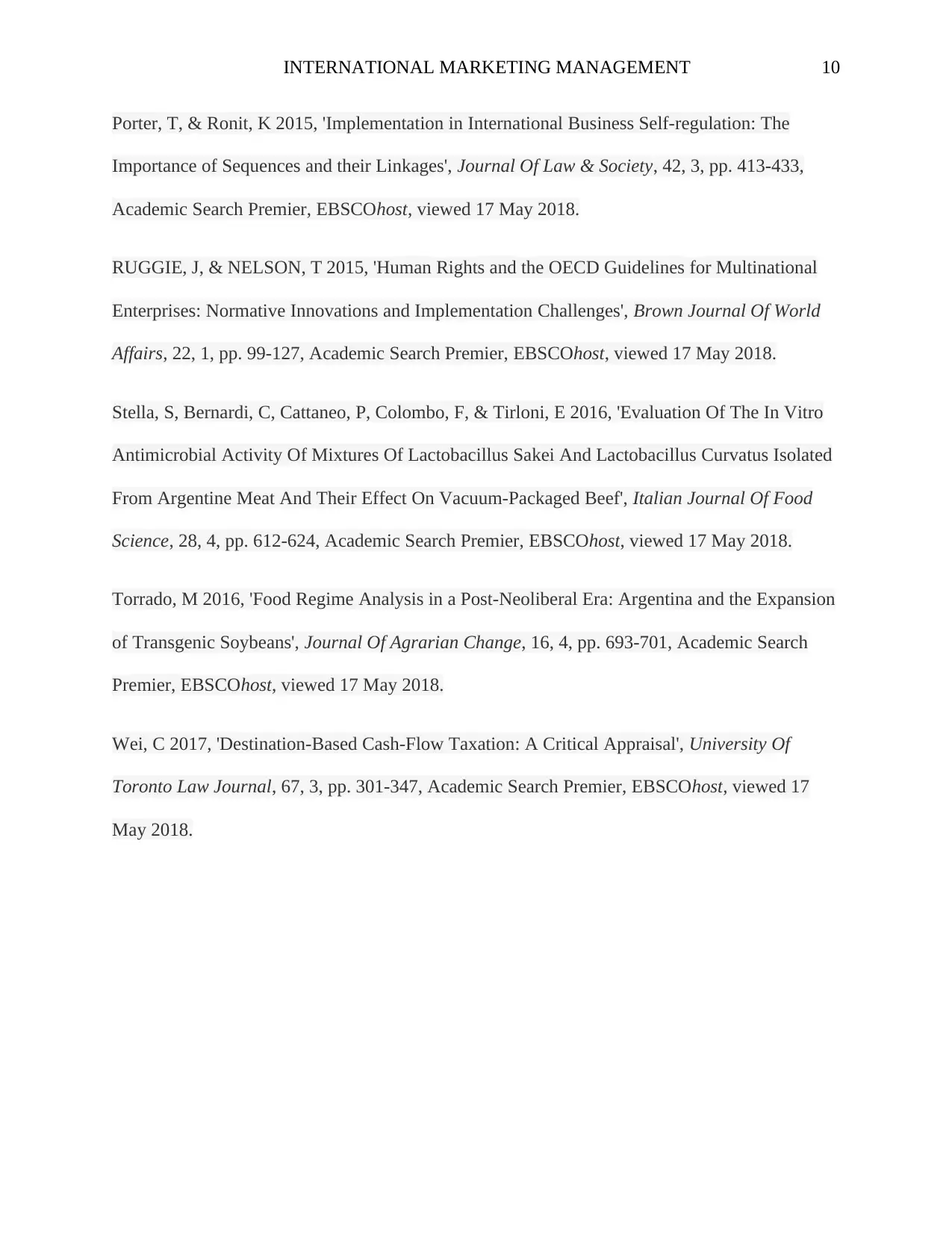
INTERNATIONAL MARKETING MANAGEMENT 10
Porter, T, & Ronit, K 2015, 'Implementation in International Business Self-regulation: The
Importance of Sequences and their Linkages', Journal Of Law & Society, 42, 3, pp. 413-433,
Academic Search Premier, EBSCOhost, viewed 17 May 2018.
RUGGIE, J, & NELSON, T 2015, 'Human Rights and the OECD Guidelines for Multinational
Enterprises: Normative Innovations and Implementation Challenges', Brown Journal Of World
Affairs, 22, 1, pp. 99-127, Academic Search Premier, EBSCOhost, viewed 17 May 2018.
Stella, S, Bernardi, C, Cattaneo, P, Colombo, F, & Tirloni, E 2016, 'Evaluation Of The In Vitro
Antimicrobial Activity Of Mixtures Of Lactobacillus Sakei And Lactobacillus Curvatus Isolated
From Argentine Meat And Their Effect On Vacuum-Packaged Beef', Italian Journal Of Food
Science, 28, 4, pp. 612-624, Academic Search Premier, EBSCOhost, viewed 17 May 2018.
Torrado, M 2016, 'Food Regime Analysis in a Post-Neoliberal Era: Argentina and the Expansion
of Transgenic Soybeans', Journal Of Agrarian Change, 16, 4, pp. 693-701, Academic Search
Premier, EBSCOhost, viewed 17 May 2018.
Wei, C 2017, 'Destination-Based Cash-Flow Taxation: A Critical Appraisal', University Of
Toronto Law Journal, 67, 3, pp. 301-347, Academic Search Premier, EBSCOhost, viewed 17
May 2018.
Porter, T, & Ronit, K 2015, 'Implementation in International Business Self-regulation: The
Importance of Sequences and their Linkages', Journal Of Law & Society, 42, 3, pp. 413-433,
Academic Search Premier, EBSCOhost, viewed 17 May 2018.
RUGGIE, J, & NELSON, T 2015, 'Human Rights and the OECD Guidelines for Multinational
Enterprises: Normative Innovations and Implementation Challenges', Brown Journal Of World
Affairs, 22, 1, pp. 99-127, Academic Search Premier, EBSCOhost, viewed 17 May 2018.
Stella, S, Bernardi, C, Cattaneo, P, Colombo, F, & Tirloni, E 2016, 'Evaluation Of The In Vitro
Antimicrobial Activity Of Mixtures Of Lactobacillus Sakei And Lactobacillus Curvatus Isolated
From Argentine Meat And Their Effect On Vacuum-Packaged Beef', Italian Journal Of Food
Science, 28, 4, pp. 612-624, Academic Search Premier, EBSCOhost, viewed 17 May 2018.
Torrado, M 2016, 'Food Regime Analysis in a Post-Neoliberal Era: Argentina and the Expansion
of Transgenic Soybeans', Journal Of Agrarian Change, 16, 4, pp. 693-701, Academic Search
Premier, EBSCOhost, viewed 17 May 2018.
Wei, C 2017, 'Destination-Based Cash-Flow Taxation: A Critical Appraisal', University Of
Toronto Law Journal, 67, 3, pp. 301-347, Academic Search Premier, EBSCOhost, viewed 17
May 2018.
1 out of 10
Related Documents
Your All-in-One AI-Powered Toolkit for Academic Success.
+13062052269
info@desklib.com
Available 24*7 on WhatsApp / Email
![[object Object]](/_next/static/media/star-bottom.7253800d.svg)
Unlock your academic potential
Copyright © 2020–2026 A2Z Services. All Rights Reserved. Developed and managed by ZUCOL.




